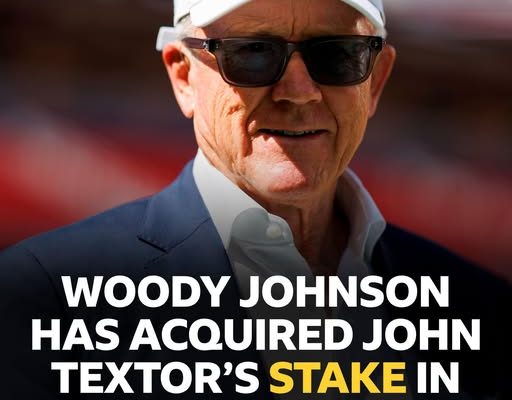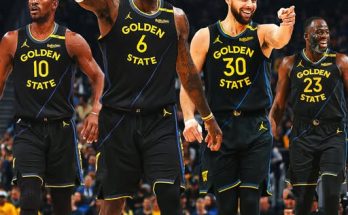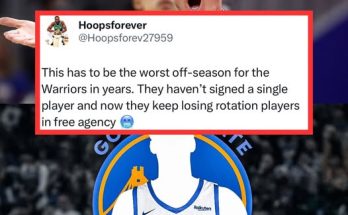The global sports world has witnessed yet another seismic shift in ownership as New York Jets owner Woody Johnson has officially acquired John Textor’s 43% stake in English Premier League club Crystal Palace. The move, which had been in the works behind the scenes for several months, now positions Johnson as a major stakeholder in one of England’s most storied football clubs, sending shockwaves across both the NFL and Premier League landscapes. In an era where cross-continental sports ownership is becoming the norm, Johnson’s investment signifies more than a mere business decision—it’s a bold declaration of intent to become a significant transatlantic force in global sports.
Woody Johnson, a billionaire businessman and philanthropist, is no stranger to high-stakes leadership. Known for his stewardship of the New York Jets since 2000 and his diplomatic role as U.S. Ambassador to the United Kingdom from 2017 to 2021, Johnson has long straddled the worlds of politics, business, and sport. His tenure in London seems to have left a lasting impression—not just politically, but culturally and personally. The allure of English football, with its passion, pageantry, and profitability, was always within his orbit. Now, with the acquisition of nearly half of Crystal Palace, he has taken a decisive step into one of the world’s most followed and lucrative leagues.
John Textor, a tech entrepreneur and owner of Eagle Football Holdings, had previously amassed a broad portfolio in global football, including stakes in Olympique Lyonnais (France), Botafogo (Brazil), and RWD Molenbeek (Belgium). However, his multi-club model had raised concerns among fans and Premier League officials alike, especially regarding potential conflicts of interest and long-term sustainability. While Textor publicly committed to Crystal Palace during his tenure, his departure from the South London club was not entirely unexpected. The shift has opened the door for a single powerful investor like Johnson to consolidate a more straightforward and potentially ambitious vision for Palace’s future.
The ramifications of this deal are multifaceted. For Crystal Palace, a club with a rich history dating back to 1905 and a fiercely loyal fanbase, Johnson’s arrival is being met with both excitement and curiosity. Historically, Palace has oscillated between top-flight security and relegation danger, with occasional forays into European qualification battles. With limited financial muscle compared to the traditional “Big Six,” Palace has carved out an identity centered around gritty performances, local talent development, and an energetic home atmosphere at Selhurst Park. The hope among supporters is that Johnson’s wealth and business acumen will provide the stability and ambition needed to push the club into a new era of competitiveness.
In recent years, Crystal Palace has laid important groundwork for growth. Under the management of Patrick Vieira and now Oliver Glasner, the club has attempted to balance attacking football with defensive discipline, relying on key talents such as Eberechi Eze, Michael Olise, and Marc Guéhi. The club’s recent success in staying mid-table despite challenges suggests it is primed for upward momentum. With a new ownership structure led by Johnson, investment in player recruitment, infrastructure, and global branding could elevate the club into consistent top-half finishes or even potential European qualification. That vision, however, depends heavily on Johnson’s strategy—whether he chooses to emulate the lavish spending of a Todd Boehly at Chelsea or adopt the more calculated, data-driven approach seen at Brighton & Hove Albion.
For Johnson himself, this acquisition is not merely a financial maneuver. It marks a significant pivot in his career and legacy. While the Jets have long struggled in the NFL, with postseason appearances and playoff wins eluding the franchise for over a decade, Johnson’s commitment to American football has never wavered. Yet his ownership has drawn criticism from fans and analysts, particularly for coaching instability and underwhelming front-office decisions. A successful spell at Crystal Palace could rewrite that narrative and offer Johnson an opportunity to redefine his image as a sports owner—one who learns from past mistakes and builds a more cohesive, progressive organization.
This also marks another chapter in the growing convergence between American investors and European football. Over the past decade, U.S.-based individuals and consortiums have poured billions into the Premier League, acquiring clubs such as Manchester United (Glazers), Liverpool (Fenway Sports Group), Arsenal (Stan Kroenke), and Chelsea (Todd Boehly and Clearlake Capital). These deals are more than vanity projects—they are strategic investments into the world’s most watched league, which offers unmatched global exposure, media rights revenue, and commercial possibilities. Johnson’s stake in Palace aligns with this trend, positioning him among a powerful elite of American investors reshaping the Premier League from within.
Critics of this Americanization of English football argue that it risks eroding traditional values, community ties, and long-term sporting integrity in favor of short-term profits and global marketing. But others contend that such investments are necessary for clubs like Palace to remain competitive in a landscape increasingly dominated by mega-rich entities. The challenge for Johnson will be to strike the delicate balance between modernization and preserving the soul of a club that prides itself on being grounded in its South London roots. Already, early reports suggest that Johnson is keen to engage with local stakeholders, support the club’s academy pipeline, and modernize Selhurst Park’s facilities—all signs that he is aware of the fine line he must walk.
While Johnson has yet to outline a detailed roadmap for his ownership, industry insiders speculate that immediate priorities will include securing long-term contracts for key players, boosting the club’s scouting and analytics departments, and exploring international expansion opportunities. Palace has traditionally underperformed in markets outside the UK despite its Premier League status. Johnson’s background in diplomacy and global business could provide the skill set needed to change that trajectory. Leveraging his connections and experience could unlock commercial partnerships, U.S. fan engagement campaigns, and even pre-season tours that boost the club’s profile abroad.
The timing of this transaction is also critical. With the Premier League season fast approaching, Palace has the chance to build momentum early and capture headlines both on and off the pitch. Johnson’s purchase may also influence summer transfer dealings, allowing for greater flexibility in pursuing targets and retaining existing stars. The message to players and fans alike is clear: Crystal Palace is no longer content to be a bystander in the Premier League—they are aiming to become a more ambitious, better-resourced, and globally relevant club.
Still, skepticism will remain until results manifest. Palace fans have seen ownership transitions before, and promises of reinvention can quickly fade. But Johnson’s visibility and resources are undeniable. Unlike faceless hedge funds or elusive foreign investors, he brings a recognizable brand and public profile. Whether that becomes a strength or a liability will depend on execution, transparency, and results. If Johnson can combine the emotional intelligence of a sportsman with the operational precision of a businessman, he may very well carve out a new legacy on the other side of the Atlantic.
This move also invites larger questions about the future of sports ownership. Will the lines between American and European sporting empires continue to blur? Will we see more hybrid organizations that operate franchises in multiple continents under one strategic umbrella? With Johnson now joining the likes of Boehly, Glazer, and Kroenke, it seems increasingly likely. The Premier League, for all its traditions, is rapidly becoming a battleground for global investors—and clubs like Crystal Palace are the latest prize.
Ultimately, the acquisition is a symbolic full-circle moment for Woody Johnson. His ambassadorship introduced him to British culture at its highest levels, and now he returns not as a diplomat, but as a stakeholder in one of the UK’s most visible institutions—football. It’s a move filled with promise and peril, opportunity and risk. The next chapter in Crystal Palace’s story begins now, and under Johnson’s stewardship, the Eagles may soon soar higher than ever before.



